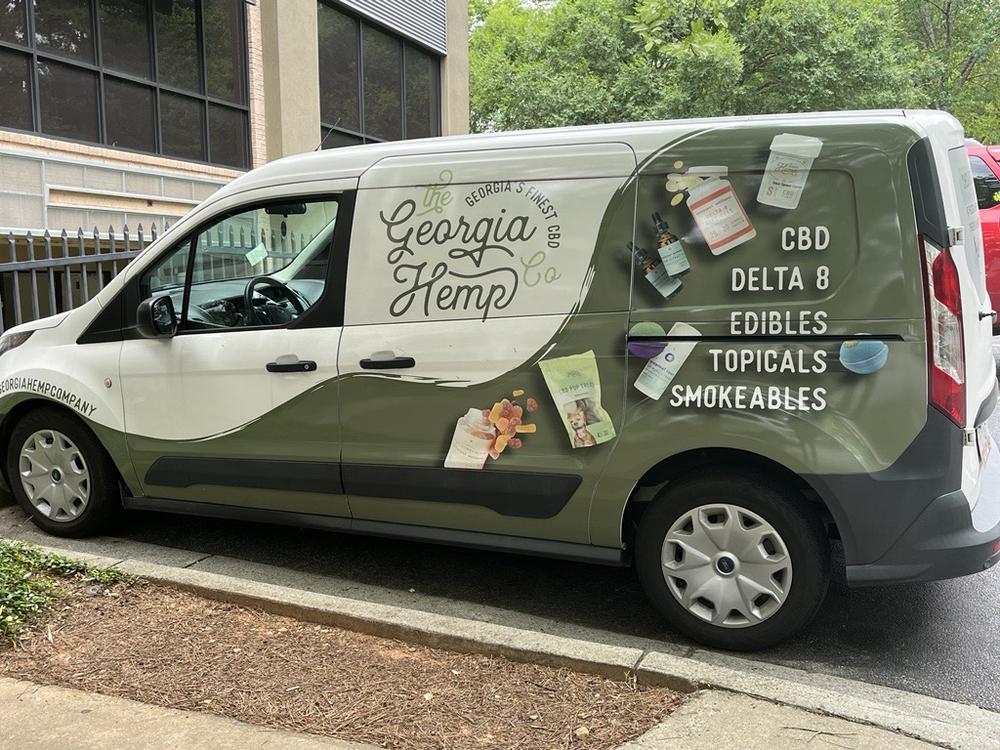
Caption
The Georgai Hemp Company van advertises products the business sells outside of a location in Sandy Springs.
Credit: Amanda Andrew / GPB News
LISTEN: Laws around marijuana are getting looser on some levels and stricter in others, leaving Georgia consumers to figure things out for themselves. GPB’s Amanda Andrews explains.

The Georgai Hemp Company van advertises products the business sells outside of a location in Sandy Springs.
This spring, the federal government proposed a plan to reclassify marijuana as a Schedule III drug, moving it into the same category as things such as prescription cough medicine.
At the same time, Georgia legislators passed laws limiting the cannabis products available in the state. Now medical marijuana patients and casual cannabis consumers in the state are navigating the changes.
Tucked away on the bottom level of a plaza in Sandy Springs is a quiet hemp shop. The smell is louder than the music.
The earthy aroma of cannabis products fills the room of the Georgia Hemp Company. Joe Salome, who co-founded the business in 2017, said being in the hemp industry means constant challenges.
“I've been fighting this for almost 10 years now,” Salome said. “Whether that's being shut down by the credit card processor, whether that's being shut down by every social media advertising platform, I can't even do that.”
Despite the hurdles, the company has four locations and a variety of products available. Hemp stores outnumber registered dispensaries in Georgia, so Salome said many of his customers are people in pain who don’t qualify for medical marijuana cards.
“You don't need one of the 16 or 18 conditions in the state of Georgia to get a card to come into my store, and we have all the same products that the dispensaries are now selling as well,” he said.
But what Salome sells isn’t what you can get with a medical card. It’s just close enough to satisfy people frustrated by the dispensary system. One remaining hope is that with the promised change in federal regulation of cannabis, real, proven, prescription cannabis drugs will become more accessible.
Right now, marijuana is in the same category as drugs including heroin, LSD and methamphetamine in what the Drug Enforcement Administration calls Schedule I — drugs the DEA said are most likely to be abused.
If marijuana is instead listed in Schedule III, it would join drugs such as caffeinated aspirin and cough medicine with codeine.
Dawn Randolph is the head of the Georgia Pharmacy Association. She said anyone thinking THC products will soon be available at the same place you get those drugs, the pharmacy counter, should think again.
“You know, this sounds really exciting,” she said. “And it is. It needs to be covered. But we've got a long way to go.”
Maybe five or six years to go, she said.
Marijuana Advocates Angela Weston and Yolanda Bennett founded the Georgia Medical Cannabis Society to help current card holders navigate the state’s complex cannabis laws. Bennett said she is looking forward to possible rescheduling because of the money she would save if her cannabis products were covered by insurance.
“We would have spent almost $1,000 at the dispensary, back in October, if it wasn't for the buy one, get one free,” Bennett said. “For some meds for a month, can you imagine?”
Bennett got her medical marijuana card in 2018, five years before Georgia opened its first dispensary. But at the state level, another change is coming. Georgia Gov. Brian Kemp signed Senate Bill 494 into law in April, further regulating the cannabis industry.
While federal rescheduling might open some doors, Angela Weston said SB 494 closes others.
“They're taking THC-A away from the CBD stores,” she said. “So now those patients who don't have one of those 19 conditions, they're in trouble.”
THC-A is a legal compound typically sold as a smokable flower bud that won’t get you high until it’s burned. That's when it turns into THC, the illegal compound which gets users high.
On Oct. 1, SB 494 will close the loophole that left THC-A legal in Georgia. So in the short run, what will be left legal are low-dose cannabis derived drugs which many say don’t address their pain and which can be very, very expensive.
Some people who have medical cards, like Weston, still turn to THC-A. They say smoking it works better than low-THC lotions or gummies.
“You know, when I'm in pain, I need a quickness," Weston said. "I need the flower for that.”